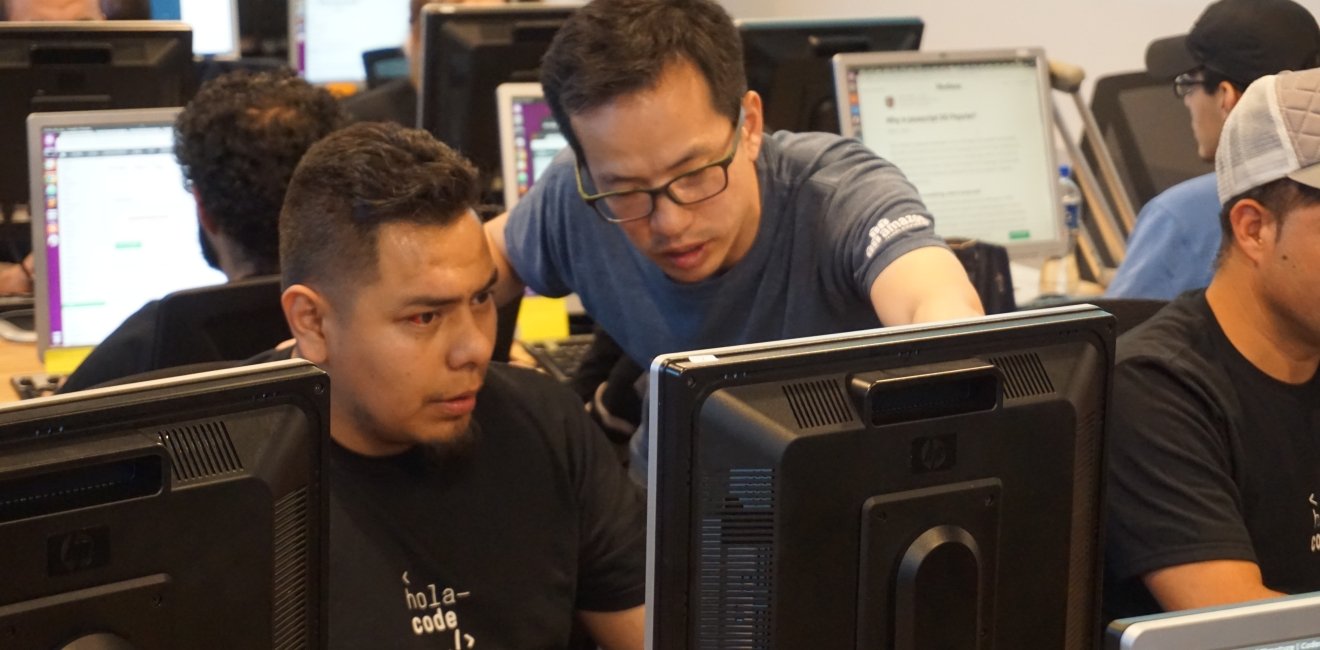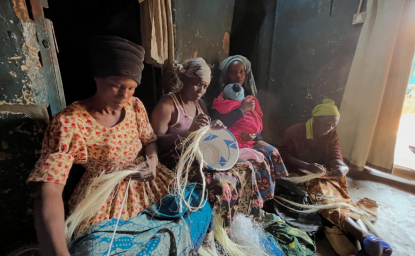Between 2009 and 2014, approximately 1 million Mexicans returned to Mexico, through voluntary or involuntary means. For many, this return brings many challenges for integrating back into the Mexican labor force, new communities, and a new way of life. Returnees face cultural shocks, language barriers, discrimination, and employment and education hurdles such as improper documentation and inability to transfer educational credits. To help provide returned Mexicans and refugees with marketable skills and integrate them into the workforce, a new private sector company, HolaCode, was established.
Below is a brief interview with HolaCode’s team – Marcela Torres, CEO & Co-founder, Aida Chávez, Head of Student Affairs, and Leni Álvarez, Head of Recruitment – which discusses their work providing innovative solutions to this challenge.
1. Can you give us a general idea of HolaCode’s mission?

HolaCode is Mexican social enterprise that promotes the integration of returned migrants and refugees through education in technology, job placement in tech and financial inclusion.
2. How does HolaCode work and what makes it unique compared to other organizations working on these issues?

HolaCode departs from the premises that 1) migrants actively contribute to the economic, social and cultural development of societies, and that 2) the technology sector provides the right set-up for “disruption” to improve integration. Our program offers a holistic and people-centered approach to integration. HolaCode offers options and choices through technology for returned migrants and refugees to seek integration into Mexican society.
HolaCoders join the program with the intention to “hack” the obstacles that have been presented to them, they “code” their own path and, when they “pay back” their tuition, they are successfully transforming their own community.
HolaCode facilitates the process of integration, yet is the student that transforms their path.
3. What are the main challenges that Mexican returnees face when they come back to Mexico?
Mexican returnees face various challenges such as language and cultural barriers, as well as lack of documents, financial inclusion, adequate housing and access to health services. They also face obstacles to validation of their academic credentials, discrimination, and suffer from PTSD or mental health conditions.
These barriers lead to low quality employment, exploitation, further discrimination and exposure to violence and abuse, creating more barriers for their integration.
4. What kind of successes has HolaCode had in confronting these challenges?

HolaCode provides returnees with accessible tech education by eliminating barriers such as educational requirements and language.
The program’s tuition is paid when students acquire a tech job and students receive a monthly stipend to focus in their studies.
HolaCode also works toward helping assure returnees’ financial inclusion.
Through a partnership with Santander Bank, we help them get their first debit card in Mexico with no commission rates or documentation requirements. Through acquiring the HolaCode loan, our students get access to their first loan in Mexico with the lowest interest rates on the market and an opportunity to start a credit history.

Through Holacode’s network of 52 hiring partners, students get offers to start their careers in technology starting with salaries up to ten times their previous income level in Mexico. In April, 21 students graduated in the first cohort, comprised of 20 returnees and 1 refugee. In only four months, HolaCode reached a 85% hiring success rate with average salaries of $35,000 MXN per month, including career growth opportunities, health coverage and competitive incentives. Our graduates have been hired in important tech companies in Mexico such as Globant, Yalo, Segundamano, and Santander Bank. In June, Holacode started its second cohort of 45 students, 43 returned migrants and 2 refugees.
5. What are the main challenges that the organization faces in meeting these needs?
The first challenge was to develop an effective program and to create an entity that could provide the loans, stipend scheme and services that we designed. A second challenge was funding the program. HolaCode had no access to grants as it was providing “informal education” and the population it serves was not a “target” for grant allocating organizations. Impact Investors such as Promotora Social Mexico and the family office Timke believed in HolaCode and provided working capital.
Our current challenge is to meet the demand from students and potential employers. It requires further working capital to be able to increase the number slots available in the program and to expand into Central America.
6. Could you share with us a success story you’ve had connecting students with a meaningful job after attending the boot camp?
Eduardo Barrañon graduated from cohort 1 on April 20th, 2018. Three weeks after, Eddie was hired by Spotlight, which is the digital hub for Santander Bank.
Quote:
“Ever since I met the HolaCode family I always thought HolaCode is home for me, being around
HolaCode family was the only thing I wanted to do. When being around the HolaCode, I felt right back where I once thought it was home. Being around people who I can relate and not being discriminated because I speak ‘Spanglish’ a language who in my family, HolaCode wouldn’t discriminate. The support was always there in HolaCode with the staff members, also a lot of support from outside came and give us support. We also had consoling support something that really helped a lot of us, I never felt alone after I met the HolaCode fam. When I came back to Mexico, I started my first job at a call center. The payment was not something I was used to: yes I could survive with, but the money was not enough to buy clothes. Now that I am a software engineer, this salary I am receiving is good enough to be able to bring my family and live a good life in Mexico without needing to go back to United States.
The moment I graduated I realized that Holacode not only taught me how to code but they taught me how to learn and how to solve problems. I will not forget all the technology tools I learned to use, I am just living in a different world, a world that I have always dream of.
The reason that I say this is because HolaCode also implemented very important set of values for us not only be successful as an engineer but to be successful in life.”

7. The work that HolaCode does is exceptional and comprehensive, but besides the main activities of the organizFination, what additional sources of support are needed both for the organization and for Mexican returnees to ensure their reintegration?
Increased information available in English to facilitate legal paperwork is very much needed for Mexican returnees. One of the biggest challenges for them, for example, is to find adequate housing. They face paperwork obstacles and there are no suitable shelters or alternative housing options. In addition, the conversation is often focused on the immediate needs of those returning. However, for proper settlement, an integral strategy of access to public health services, long-term employment and financial inclusion needs to be envisioned by policy makers.
8. What are HolaCode’s goals and vision for the future?
Through education in technology we have been able to tap into the endless talent of returned migrants in Mexico, while increasing the country’s capacity to manage technology. Our goal is to expand our “edtech” offerings and capture more talented migrants, expand into Central America and provide the right tools and high quality education for the future tech leaders in the region.

HolaCode’s work is an exemplary example of connecting Mexican returnees with valuable work opportunities. By providing valuable training, financial assistance, and community support, HolaCode is addressing both skills gaps in the Mexican labor force and migrant integration challenges. However, HolaCode’s work must be complemented by increased support from the public and private sectors, marrying policy solutions to on-the-ground initiatives in order to create a process that is accessible to more returnees and refugees with a diverse array of opportunities. Mexican returnees present both a challenge and an opportunity for Mexico’s advance in workforce development. They can bring valuable energy and creativity to the Mexican workforce, if given the opportunity.







